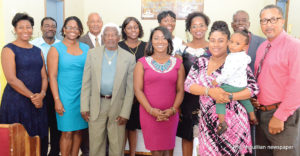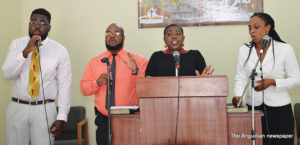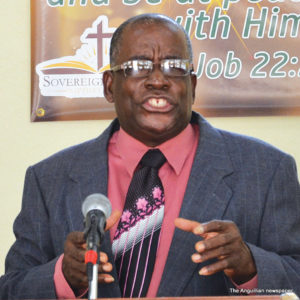
Radio Anguilla Staff and Churchmen
As Radio Anguilla observed its Fiftieth Anniversary this week, no other Government Department on the island has the unique history and tale of survival than this official agency formally known as the Department of Information and Broadcasting.
Born out of “political expediency”, as British diplomats admitted in early April 1969, Radio Anguilla made its first broadcasts from HMS Minera, a British frigate off Road Bay. It was just a few weeks after the occupation of Anguilla by British troops on March 19 that year. The belief was that a radio station was the best means to communicate to the people of the island at that time and to stifle the propaganda being broadcast by ZIZ, the St. Kitts Government’s mouthpiece, following the May 1967 Anguilla Revolution.
Within days, Radio Anguilla, basically comprising a set of antiquated ship communication equipment, was moved to the old rat-infested agricultural barn house in The Valley from where it operated for 20 years. With frequent equipment breakdowns, and claims that the station had served its purpose, there was talk of closing down the station. But it was decide

d that Anguilla needed its own radio station, like its neighbouring islands, and so the British Government turned it over to the local administration on April 1, 1976.
Radio Anguilla was then restyled the Department of Information and Broadcasting, making a unique entry for itself and its staff into the public service. In 1989 the station was transferred to the then just-built top floor of the Treasury and Customs Departments, opposite the Ministry of Finance. The rest is history.
“Radio Anguilla has come a long way,” Pastor John Gumbs, of the Sovereign Grace Baptist Church, remarked at the station’s 50th Anniversary Service on Sunday, April 7, this week. With some 43 years of the Sovereign Grace Broadcast on the station, and being the longest local religious broadcaster there, both his remark and the choice of his church for the service meshed very well.
Pastor John, who recounted much of Radio Anguilla’s difficult past, had high praise for both the early and present employees at Radio Anguilla. He thanked the latter, in particular, for faithfully carrying on the work of the station and for their hard work and dedication. Apart from their general information and entertainment work, he commended them for their exceptional service during the passage of Hurricane Irma and the risks they had taken. He observed that there were other times when the station operated under difficult circumstances, but that the staff had acquitted themselves very well. He encouraged them to continue to take pride in their contribution to the people of the island; to use every opportunity and means, such as technology and the internet, to further develop their knowledge and service, and to learn from others capable of assisting them.

Using the analogy of the Biblical story, where Jesus advised his discouraged disciples to cast their net into deeper waters to catch an abundance of fish, which eluded them, he told the Radio Anguilla employees: “Look beyond your situation and the discouragement you may have, and launch out into the deep.” He added: “You are doing a tremendous job by your impact on the island – and your labour is not in vain.”
Among those in attendance were the Minister of Home Affairs with responsibility for Information and Broadcasting, Mrs. Cora Richardson-Hodge, and her Permanent Secretary, Mrs. Chanelle Petty Barrett.
Others in attendance were Pastor Cephas Webster, who has a 24-year-old programme on Radio Anguilla and who delivered one of the anniversary prayers. Mr. Quincy Gumbs, an Associate Pastor and an original sponsor of Radio Anguilla’s regional news for many years, was also in attendance.
Meanwhile, as Radio Anguilla observes 50 years of broadcasting, renovation work is in progress at its studios on the Secretariat compound and at the new transmitter site at Crocus Hill. The work is being funded under the Anguilla Programme financed by the UK Government.







